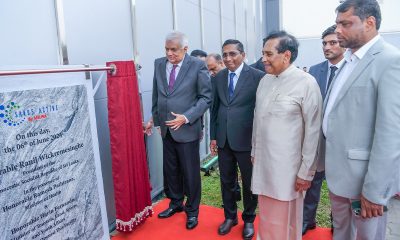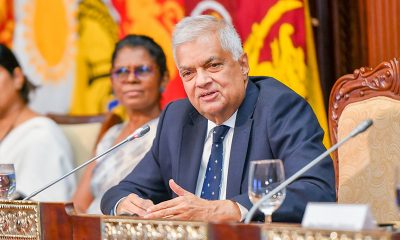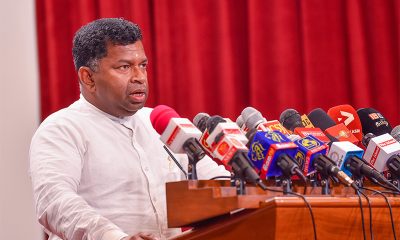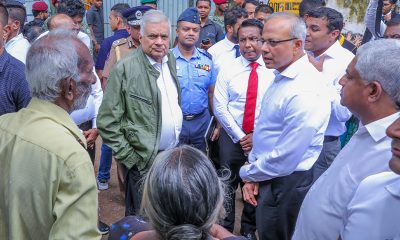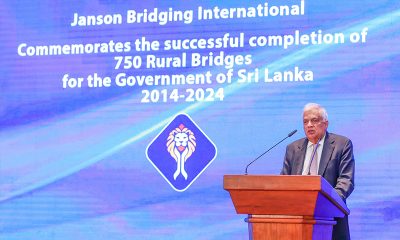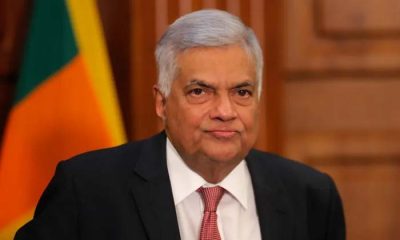News
President promises Rs 1 bn for research on Buddha’s teachings and Artificial Intelligence
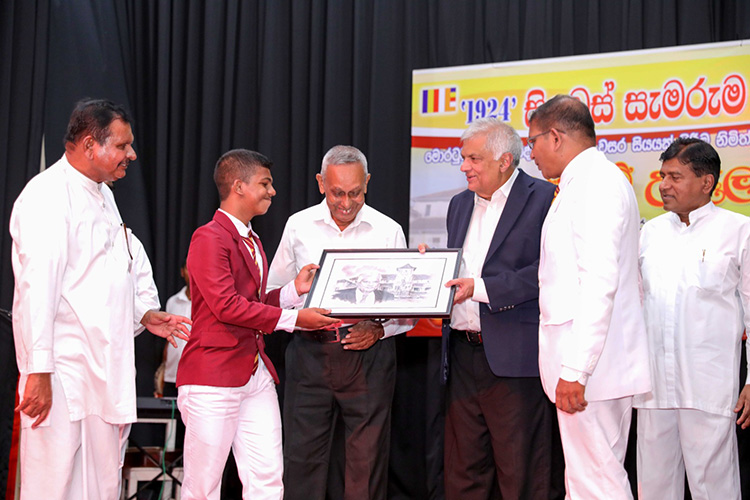
President Ranil Wickremesinghe has assured that one billion rupees would be allocated next year for research on the Buddha’s teachings and Artificial Intelligence.The President disclosed that the project was previously scheduled to commence this year but had to be postponed due to the absence of required legislation for the regulation of AI. The President said that the project could get underway once the parliament adopted the new laws.
President Wickremesinghe said so at the 100th anniversary celebration of the Sri Lanka Buddhist Society Moratuwa, held Saturday (11) at the Moratuwa Buddhist Society Hall.
The Moratuwa Buddhist Society Hall, initiated under the Sri Lanka Buddhist Society Moratuwa, had its foundation stone laid in 1925. This society was established on May 11, 1924, under the leadership of Mr. Arthur V. Dias. The building was inaugurated as the Buddhist Headquarters for Buddhist population in Moratuwa on June 24, 1929, by the then Governor of British Ceylon Sir Herbert J. Stanley with officiating the opening ceremony. Additionally, on that same day, the foundation stone for Moratuwa College was also laid.
The President said that the government would finance the restoration of the Moratuwa Buddhist Society Hall, which is approaching its centenary.
The Vice President of Moratuwa Buddhist Society Dhammika Chandranath Fernando presented the centenary commemorative souvenir to President Wickremesinghe.
President Wickremesinghe, speaking at the event, added:
“Today, the world is confronted with a significant threat posed by climate change. The unprecedented intensity of sunlight we’re experiencing is unlike anything we’ve encountered before. We find ourselves in a challenging situation that requires focused efforts to mitigate climate warming. Additionally, we’re grappling with a substantial water scarcity issue. It’s essential to approach these challenges in alignment with the teachings of Buddha.
In the next two or three decades, climate change will emerge as one of the primary global challenges. According to Buddha’s teachings, this issue stems from civilization’s greed for rapid progress. The widespread desire for advancement has led to increased vehicle usage, resulting in significant environmental damage. Consequently, human society has inflicted considerable harm on the environment. Hence, it’s crucial to prioritize efforts to control climate change.
Today, the world is witnessing rapid technological advancements.
Despite initial beliefs after the atomic bomb explosion in 1945 that technological progress might cease, there has been significant advancement across all sectors. Particularly, the IT sector has seen remarkable progress. During our school days, computers and mobile phones were non-existent, but with modern technological advancements, we now have access to Artificial Intelligence.
We are currently at the dawn of Artificial Intelligence, prompting questions about its trajectory over the next two decades. It’s
essential to explore the relationship between artificial intelligence and Buddhism.
Buddha’s teachings emphasize the power of our minds in shaping our lives. By mastering our minds, we pave the way for progress; failure to do so leaves us with no future. This message was specifically intended for humanity, highlighting the importance of controlling our minds to overcome desires.
Now, artificial intelligence (AI) mirrors the capabilities of the
human mind. AI can process vast amounts of information and operate accordingly. Therefore, it’s pertinent to explore the connection between Buddha’s teachings and AI, considering their shared focus on the mind’s control and its implications for our actions.
If artificial intelligence promotes a different religion, it could pose a threat to Buddhism, so it’s crucial to consider this possibility. Throughout history, Buddhism in Sri Lanka has been influenced by Hinduism, Mahayana and political influences. With the emergence of artificial intelligence, it adds another layer of influence. Therefore, we must contemplate whether AI might propagate alternative doctrines.
It’s essential for people to contemplate the implications of integrating Dhamma with the mobile devices they use. This issue extends beyond Buddhism to other religions as well.
Hence, we are implementing new regulations to oversee artificial intelligence. The Ministry of Technology has drafted legislation for technology development, including plans to establish an artificial intelligence centre. Countries like the United Kingdom and the European Union have already enacted laws to govern artificial intelligence, and we must follow suit.”
News
US sports envoys to Lanka to champion youth development

The U.S. Embassy in Colombo welcomed the U.S. Sports Envoys to Sri Lanka, former National Basketball Association (NBA) and Women’s National Basketball Association (WNBA) players Stephen Howard and Astou Ndiaye, from June 8 through 14.
The Public Diplomacy section of the U.S. Embassy said that it would launch a weeklong basketball program intended to harness the unifying power of sports, made possible through collaboration with Foundation of Goodness and IImpact Hoop Lab.
While in Sri Lanka, Howard and Ndiaye, both retired professional basketball players, will conduct a weeklong program, Hoops for Hope: Bridging Borders through Basketball. The Sports Envoys will lead basketball clinics and exhibition matches and engage in leadership sessions in Colombo and Southern Province for youth aged 14-18 from Northern, Uva, Eastern and Western Provinces, offering skills and leadership training both on and off the court. The U.S. Envoys will also share their expertise with the Sri Lanka Basketball Federation, national coaches, and players, furthering the development of basketball in the country. Beyond the clinics, they will collaborate with Sri Lankan schoolchildren to take part in a community service project in the Colombo area.
“We are so proud to welcome Stephen and Astou as our Sports Envoys to Sri Lanka, to build on the strong people-to-people connections between the United States and Sri Lanka,” said U.S. Ambassador Julie Chung. “The lessons that will be shared by our Sports Envoys – communication, teamwork, resilience, inclusion, and conflict resolution – are essential for leadership development, community building, equality, and peace. The U.S. Sports Envoy program is a testament to our belief that sports can be a powerful tool in promoting peace and unity.”
News
Rahuman questions sudden cancellation of leave of CEB employees

SJB Colombo District MP Mujibur Rahuman in parliament demanded to know from the government the reasons for CEB suspending the leave of all its employees until further notice from Thursday.
MP Rahuman said that the CEB has got an acting General Manager anew and the latter yesterday morning issued a circular suspending leave of all CEB employees with immediate effect until further notice.
“We demand that Minister Kanchana Wijesekera should explain this to the House. This circular was issued while this debate on the new Electricity Amendment Bill was pending. There are many who oppose this Bill. The Minister must tell parliament the reason for the urge to cancel the leave of CEB employees,” the MP said.However, Speaker Mahinda Yapa Abeywardena prevented Minister Wijesekera responding to the query and said that the matter raised by MP Rahuman was not relevant.
News
CIPM successfully concludes 8th Annual Symposium

The Chartered Institute of Personnel Management (CIPM) successfully concluded the 8th Annual CIPM Symposium, which took place on 31st May 2024. Themed “Nurturing the Human Element—Redefining HRM in a Rapidly Changing World,” the symposium underscored the pivotal role of human resource management (HRM) in today’s dynamic global landscape. Since its inception in 1959, CIPM has been dedicated to advancing the HR profession through education, professional development, and advocacy, solidifying its position as Sri Lanka’s leading professional body for HRM.
Ken Vijayakumar, the President of the CIPM, graced the occasion as the chief guest. The symposium commenced with the welcome address by the Chairperson, Prof. Arosha Adikaram, followed by the Web Launch of the Symposium Proceedings and Abstract Book by the CIPM President. The event featured distinguished addresses, including a speech by Chief Guest Ken Vijayakumar, President of CIPM, and an address by Guest of Honor Shakthi Ranatunga, Chief Operating Officer of MAS Holdings Pvt. Ltd., Sri Lanka.
The symposium also featured an inspiring keynote address by Prof. Mario Fernando, Professor of Management and Director of the Centre for Cross Cultural Management (CCCM) at the University of Wollongong, Australia.
Vote of Thanks of the inauguration session was delivered by Dr. Dillanjani Weeratunga, Symposium Co-chair.
The symposium served as a comprehensive platform for researchers to present their findings across a wide range of critical topics in HRM. These included Cultural Diversity and Inclusion, Talent Development and Retention, Ethical Leadership and Corporate Social Responsibility, Adapting to Technological Advancements, Mental Health and Well-being at Work, Global Workforce Challenges, Employee Empowerment, and Reskilling and Upskilling.
The plenary session was led by Prof. Wasantha Rajapakse. Certificates were awarded to the best paper presenters during the valedictory session, followed by a vote of thanks delivered by Kamani Perera, Manager of Research and Development.
The annual symposium of CIPM was a truly inclusive event, attracting a diverse audience that spanned undergraduates, graduates, working professionals, research scholars and lecturers. This widespread interest highlights the symposium’s significance in the field of HRM, offering a unique opportunity for everyone to network and learn from scholarly brains.The CIPM International Research Symposium was sponsored by Hambantota International Port, Sri Lanka Institute of Information Technology (SLIIT), E B Creasy & Co. PLC, and Print Xcel Company.


